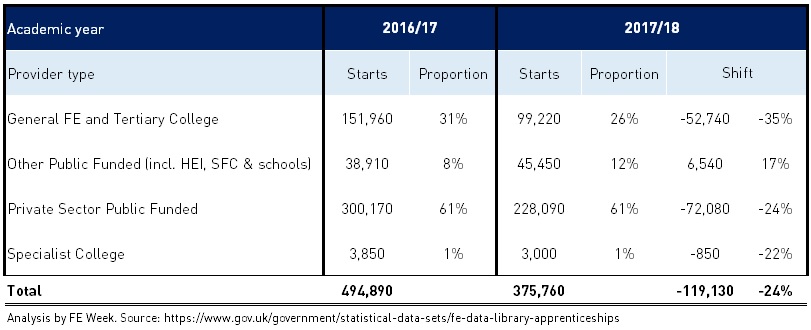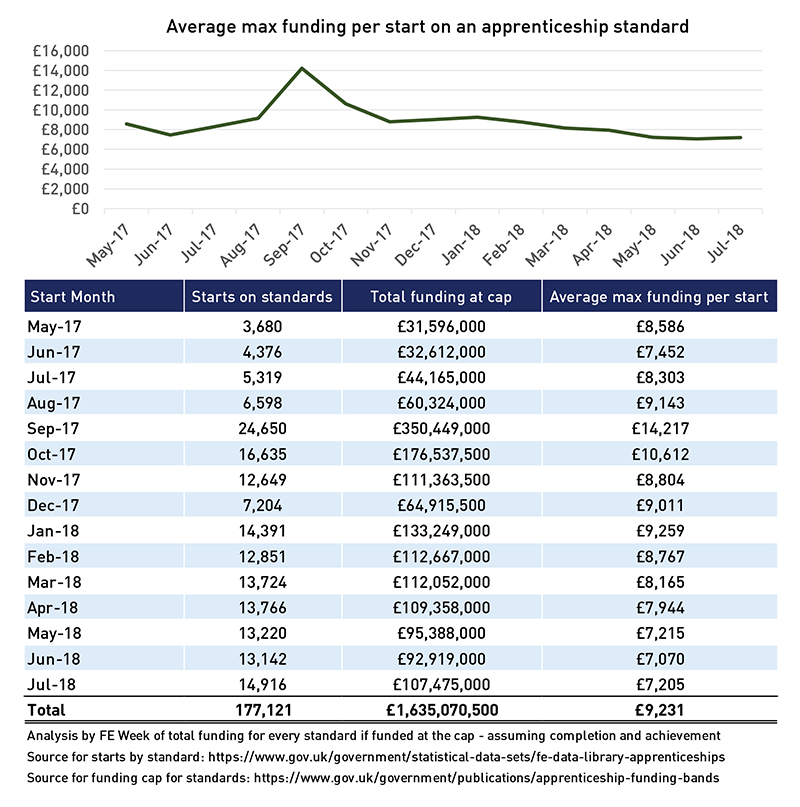The Association of Colleges has warned that colleges’ share of the apprenticeship market will continue to shrink, after FE Week analysis revealed they have been hit hardest by the move to levy funding.
New statistics from the Department for Education, which included the number of starts per provider for the first time, show that colleges’ share of the market dropped from 31 to 26 per cent from 2016/17 to 2017/18, while their starts plummeted 35 per cent.
Teresa Frith, senior policy manager at the AoC, said that colleges had been particularly badly hit by changes in the apprenticeships market – and warned that the situation was likely to get worse.
“Apprenticeship reforms have shifted funding towards large employers and higher level standards while restricting the money paid for younger apprentices and small companies,” she said.
“This change in the market has made it harder for colleges.”
Referring to FE Week’s exclusive revelation last week that the apprenticeships budget is forecast to be overspent by £500 million this year, she warned that “as the budget becomes more over-committed in 2019, there will be more and more colleges turning small employers and young apprentices down because they can’t afford to offer training for free”.
Ms Frith said it was “right to highlight shifts in the supply side of the apprenticeship market” but urged the DfE to publish information on which employers are spending their levy funds.
“Without this data, we’ll only have a partial picture of what is going on.”

The new data showed that colleges were responsible for 99,220 starts last year, down by 35 per cent – or 52,740 – on the previous year’s total of 151,960.
That’s an 11 percentage-point bigger fall than the sector-wide drop of 24 per cent, revealed in last week’s final year figures.
Some of this fall in starts will have been the result of changes to rules around subcontracting which hit colleges that had previously subcontracted much of their provision.
West Nottinghamshire College, which previously subcontracted the overwhelming majority of its provision, had just 1,440 starts last year – down by a massive 79 per cent on the previous year’s total of 6,830.
The college blamed the rule changes, which meant it could no longer subcontract entire apprenticeship programmes, for having to make £2.7 million savings and cut 100 jobs earlier this year – before it spiralled into a financial crisis that led former principal Dame Asha Khemka to resign.
And Eastleigh College, which previously told FE Week it subcontracted around 80 per cent of its provision, saw its start numbers drop by 75 per cent – from 6,720 in 2016/17 to 1,630 in 2017/18.
While colleges’ share of the market declined last year, “other public funded” providers – which includes universities and employers – saw their share go up from eight per cent to 12 per cent as starts jumped 17 per cent.
They were responsible for 45,540 starts last year – an increase of 17 per cent on the previous year’s figure of 38,910.
Much of this growth was at providers new to the apprenticeship market, including universities delivering degree-level apprenticeships for the first time.
Independent providers’ share of the market remained at 61 per cent over the two years, while starts fell by 24 per cent – the same as the sector average.
They delivered 228,090 starts in 2017/18, down from 300,170 the year before.
That’s a drop of 24 per cent, the same proportion by which starts fell across the board last year, according to final full year figures published last week.
A freedom of information request last year by the Association of Employment and Learning Providers revealed that 74 per cent of all apprenticeship starts in 2015/16 were with independent providers, while colleges were responsible for just 21 per cent.
Last month the skills minister Anne Milton told the Association of Colleges conference that she wanted collaboration between colleges and private providers in delivering apprenticeships.
Her words were a change to what was written in her speech, which urged colleges to be “real competition” for private providers.

